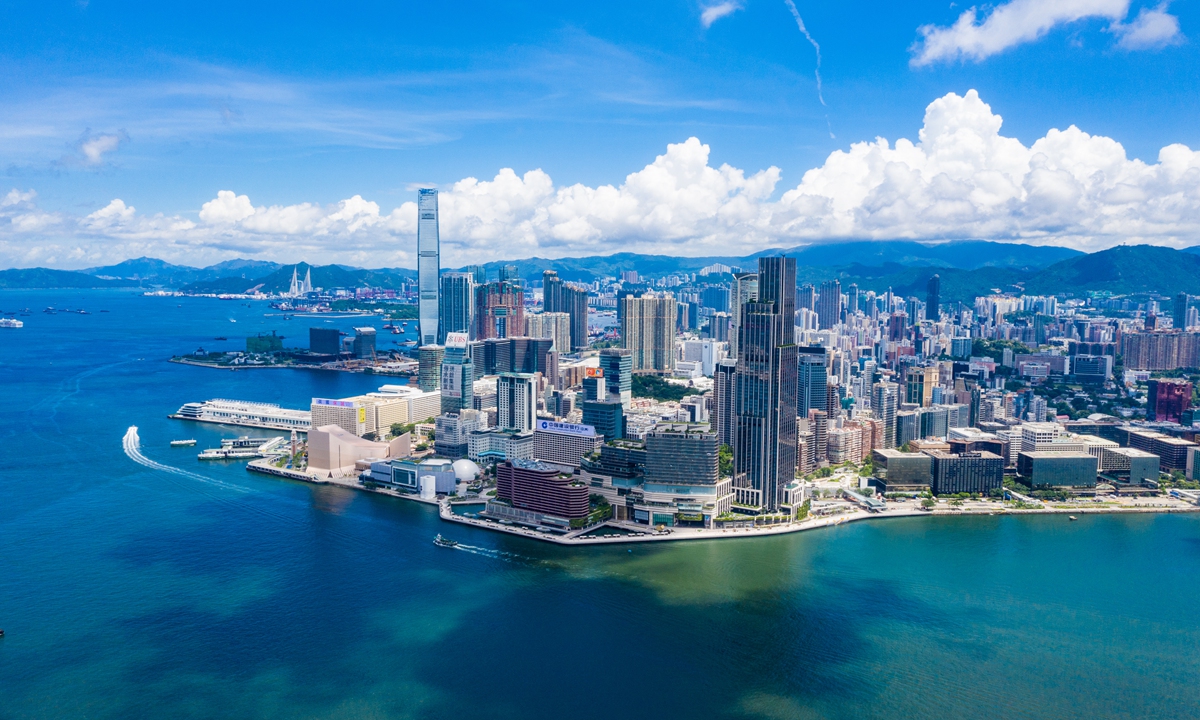A view of Kowloon City, Hong Kong Photo: VCG
As global trade patterns undergo significant reshaping, Hong Kong’s pivotal role as a “super-connector” and “super value-adder” is becoming increasingly prominent, with its advantages growing stronger, the Hong Kong Special Administrative Region (HKSAR)’s Financial Secretary Paul Chan Mo-po said on Sunday.
In an essay posted on the HKSAR government’s official website, the HKSAR financial chief also underscored the city’s potential to create new growth points while contributing to national development.
“Under the reshaping of regional trade patterns, geopolitical tensions and tariff disputes are reconfiguring the international trade landscape and supply chain structures, bringing new development opportunities for Hong Kong’s trade, shipping, financial, and professional services sectors,” Chan said.
“If we can seize the opportunity and harness the tensions arising from the interplay between traditional and emerging models during Hong Kong’s economic transition, turning them into a driving force for faster economic upgrading and restructuring, then it will create new growth points for the city,” he added.
Data cited by Chan showed robust performance in Hong Kong’s trade. Serving as a transit hub for goods, Hong Kong has seen year-on-year double-digit growth in merchandise trade in recent months, Chan said.
For example, in the first half of this year, total exports of goods to Vietnam rose by more than 50 percent, while exports to Malaysia increased by about 30 percent. Imports from Vietnam grew roughly 70 percent, and imports from Malaysia rose by about 30 percent, official data showed.
“This reflects that some exporters may have shipped goods ahead of time to avoid potential tariff pressures, highlighting opportunities arising from the evolving international trade landscape, particularly the deepening of regional trade cooperation,” Chan noted.
Hong Kong’s ability to pivot amid global trade disruptions highlights its strategic role as a regional hub, particularly in strengthening ties with ASEAN, Liang Haiming, dean of the Belt and Road Research Institute at Hainan University, who closely follows the Hong Kong economy, told the Global Times on Sunday.
Chan emphasized new development opportunities arising from the integration of supply chains and the reshaping of trade patterns, particularly in bulk commodities such as non-ferrous metals. He noted that enhancing the stability and resilience of national and regional metal supplies carries strategic significance.
In January this year, the HKSAR joined the global warehouse and delivery network of the London Metal Exchange (LME), a milestone that more closely connects the Chinese mainland with the world’s most active metal trading markets, according to the HKSAR government.
Within seven months, all eight approved LME warehouses in Hong Kong have become operational. Official data showed that by early August, more than 8,000 tons of LME-registered warrants had been issued to support LME contract deliveries.
“The LME-approved warehouses help improve the efficiency of non-ferrous metal allocation, reduce costs, and ensure stable supply of key metal resources in the region,” Chan said, highlighting its role in stimulating the growth of financial services including trade finance, insurance, risk management, hedging, and derivative products.
These developments position the HKSAR to promote more commodity trading denominated and settled in yuan, adding momentum to the city’s offshore yuan business and supporting the steady and prudent internationalization of the currency, Chan said.
Furthermore, to support Chinese enterprises “going global,” especially in the Global South and regions along the Belt and Road Initiative, Hong Kong is positioning itself as a hub for cross-border supply chain management, according to the essay.
“For these companies, Hong Kong is the preferred platform for establishing overseas treasury centers and multinational supply chain management centers,” Chan noted.
The HKSAR government has established a high-value supply chain service mechanism, offering one-stop consulting services for companies expanding internationally through Hong Kong, the essay said.
“As global trade patterns evolve and cross-border opportunities expand, the role and advantages of Hong Kong’s super-connectors and super value-adders are becoming increasingly evident,” Chan said. By continuously exploring new business areas and growth points, leveraging their strengths, and serving national needs, they can open broader paths for the city’s sustained economic development, he added.


